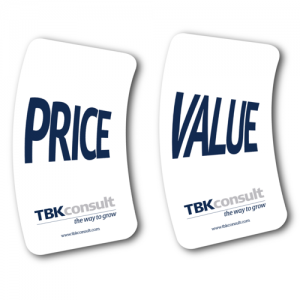How to Deliver Winning Proposals – Part 8
“The price is what you pay and the value is what you get” applies to anything you sell. Splitting these two is the most fundamental task of anyone responsible for revenue generation. If you are in big ticket sales and especially in consulting, then agreeing with the client on the value of the project is a prerequisite for determining the price. The price should never exceed 10-20% of the value.
Being able to make such an assessment explains why the proposal is the very last stage of the management consulting sales process. It is the confirmation of what we have already agreed during our discussions with the client. If you make the proposal too early in the sales process then the probability of loosing the business will increase substantially. There should be nothing in the proposal that comes as a surprise to the client.
Why do we need to determine the value?
How will you price your services?
Time and materials is fine for operational support such as freelancing or interim services where you operate directly under the client’s operational management.
If you charge time and materials as a management consultant in a change project you will immediately introduce a conflict of interest with your client.
We need to determine the value for two main reasons:
- To keep the focus on the value and not on the activities
- To set the fee we will charge for helping the client change his situation.
Determining exactly which activities are required to deliver a certain change is not possible. The scope of a management consulting project should always be defined by the value it is supposed to deliver. The activities can be defined as we move forward.
Our fee should be in the range of 10% of the value we create. Personally I am not interested in working on activity based projects. I am interested in working on value based projects where my fee leaves room for doing what is required and where my fee is no more than 10% of the value created. In such projects I will be 100% aligned with my client’s interests and I am certain that my client is focused on getting to that situation as fast and as easily as possible.
The definition of value is difficult (at first)
Defining the value created for the client turns out to be a very difficult exercise for most consultants. I also had major trouble with this portion of the proposal in the early days of my career as an independent management consultant. It wasn’t until I started looking for the value and discussing it with my clients that I cracked the code.
Management consulting clients fall into two groups:
- Input focused
- Result focused

Input focused clients will ask you to perform activities such as strategy facilitation, focus groups, organizational assessments, recruitment, executive search, market assessments, channel program development etc. etc. While these activities are certainly meaningful they do not represent any value per se. We therefore need to ask our potential clients why they want to invest in these activities. What do they expect to achieve? It always turns out that these activities are undertaken in the context of change. Something needs to be fixed and improved as to secure better performance and thus improved results in the future.
Result focused clients will ask you to secure results. These clients are not particularly interested in the activity details, but are more interested in the final results. They will typically ask which activities we will propose to ensure that the results are delivered. These types of clients will often try to engage us on a “pay for results – no cure no pay” basis. As management consultants we work on a “first pay -> then cure” basis. Thus, we need to educate the result focused client to assume responsibility for her own business and measure us on the value we deliver.
In both situations we need to educate the potential clients. We will have to work with the “input focused” clients to define the results wanted. We will have to work with the “result focused” clients to define the value required to deliver the results.
Our obligations as independent management consultants are to work with the client to change his situation so that he can generate the results. The value we deliver is the change in the client’s situation that enables him to produce the results.
Value and results are not the same
Why don’t we just define the value as equal to the results?
The “result focused” client would love it if we did that, but he will probably not accept that we take over the running of his company. Delivering results requires that you are in full control of the organization and it’s resources. The executive management of a company/institution is responsible for delivering the results. The independent management consultant is responsible for identifying the changes required that will enable the organization to deliver the results. He may also help implement these changes, but he is not responsible for the results. The results will typically materialize long after the consultant has left the building.
Other posts in this series
How to Deliver Winning Proposals – Part 1
How to Deliver Winning Proposals – Part 2
How to Deliver Winning Proposals – Part 3
How to Deliver Winning Proposals – Part 4
How to Deliver Winning Proposals – Part 5
How to Deliver Winning Proposals – Part 6
How to Deliver Winning Proposals – Part 7
How to Deliver Winning Proposals – Part 9
How to Deliver Winning Proposals – Part 10
How to Deliver Winning Proposals – Part 11
How to Deliver Winning Proposals – Part 12









